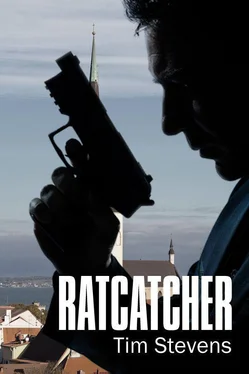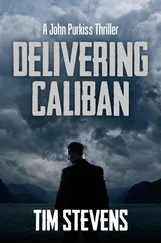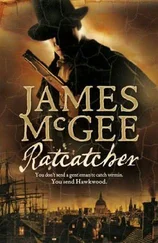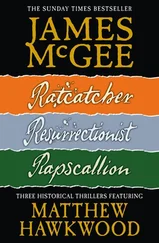Tim Stevens - Ratcatcher
Здесь есть возможность читать онлайн «Tim Stevens - Ratcatcher» весь текст электронной книги совершенно бесплатно (целиком полную версию без сокращений). В некоторых случаях можно слушать аудио, скачать через торрент в формате fb2 и присутствует краткое содержание. Жанр: Триллер, на английском языке. Описание произведения, (предисловие) а так же отзывы посетителей доступны на портале библиотеки ЛибКат.
- Название:Ratcatcher
- Автор:
- Жанр:
- Год:неизвестен
- ISBN:нет данных
- Рейтинг книги:5 / 5. Голосов: 1
-
Избранное:Добавить в избранное
- Отзывы:
-
Ваша оценка:
- 100
- 1
- 2
- 3
- 4
- 5
Ratcatcher: краткое содержание, описание и аннотация
Предлагаем к чтению аннотацию, описание, краткое содержание или предисловие (зависит от того, что написал сам автор книги «Ratcatcher»). Если вы не нашли необходимую информацию о книге — напишите в комментариях, мы постараемся отыскать её.
Ratcatcher — читать онлайн бесплатно полную книгу (весь текст) целиком
Ниже представлен текст книги, разбитый по страницам. Система сохранения места последней прочитанной страницы, позволяет с удобством читать онлайн бесплатно книгу «Ratcatcher», без необходимости каждый раз заново искать на чём Вы остановились. Поставьте закладку, и сможете в любой момент перейти на страницу, на которой закончили чтение.
Интервал:
Закладка:
With as fast a run-up as he could achieve in such a short distance he launched himself at the jagged remains of the window and into the wet dark.
The shock of cold air and rain clutched at his breath. He landed hard on his shoulder and rolled, keeping the momentum going, tumbling over and over down a soggy slope of dirt and gravel, resisting the screaming urge to stop and look back. Somewhere far off he heard shouting again and the firing started. Dimly he registered that the bullets were relatively low-velocity because he heard the crump of the shots before the stinging whine as they sang past him.
When the ground stopped sloping and ran level he rolled once more and peered around at a crouch, taking a moment to aim, and releasing three shots at the window he had come through. It was almost hidden behind the hump of the ground he’d rolled down but he saw a figure twitch away. He kept low, below the hump, and ran along the edge of it, away from the building, which he saw was a broad two-storey office block of some kind.
The squall was surging again, sheets of rain lashing and cracking at the mercy of a puckish wind. Ahead of him was a concrete wall that enclosed the property. On the other side of it was a field. He reached the wall and tried to leap it, but without the use of his hands it was impossible. He fell back, gasping.
Purkiss looked back. From this distance the building he had vacated suddenly had a context, slotting in among the other parts like a piece from a jigsaw puzzle. On the other side of the building was a row of large, squat, oblong structures that receded away, floodlights illuminating the nearest one. A series of hangars.
He was in an airfield, and a largely disused one by the look of it. Off to the left, far behind the office block and the hangars, an assortment of aircraft shells sat and rusted, their incomplete, gutted state visible even in the silhouettes that were all that was visible of them against the night sky. To the right, disappearing into the shadows thrown by the floodlights, was what looked like a runway.
Figures were emerging from around the building, three, four, their shouts carrying faintly through the rain, their faltering gaits suggesting they didn’t know exactly where he was. He strained eyes and ears for the first evidence of dogs, but there was none. Purkiss thanked Kendrick silently. He’d disposed of all of them back at the farm.
On either side of him the wall stretched as far as he could see. The other side wasn’t visible from this close to the wall, but on his approach down the slope he’d seen the flat field stretching some distance before clusters of trees began to appear. Purkiss scrambled along the base of the wall to his right, where it was darker, and peered at an approaching shape. A shed of some kind.
It was dilapidated, and the wooden door gave easily despite the awkwardness with which he was forced to pull at it, tearing around the padlock. Inside, tools and mechanical equipment mouldered, red with rust. He found a hacksaw that still showed some silver in its blade. Squinting over his shoulder, he clamped its handle in a vice on the edge of a workbench and began to rub the plastic tie around his wrists rapidly against the teeth, feeling the serrations bite through his flesh. His arms sprang free and he flexed them, revelling for an instant in the sensation. Then he picked up the pistol again — another SIG-Sauer, perhaps standard issue with this outfit — and looked out through the door. He saw the figures, blurred through the rain, running towards the wall further back in the direction he’d come from. He stepped out, tested the door of the shed with both hands, and with a sharp tug wrenched it off its hinges.
He lugged the door over to the wall and propped it at an angle, thankful that it reached the top and that the holes punched in it by time and neglect looked as if they would serve as footholes. Instead of running up it, he headed off along the base of the wall on the other side of the shed, the way he’d been going.
His wrists were sticky, the blood black in the darkness. He thought, hysterical laughter rising and threatening to erupt: you’ll need a tetanus shot .
They’d left him his watch, a sports model. He pressed the button for the backlight, saw the time. Five forty-nine.
Two hours to go.
Thirty-Five
The first sharp noise had been equivocal, a far-off echo like something falling, and none of his men reacted so Venedikt disregarded it. The second could not have been interpreted as anything other than a gunshot, muffled to some extent by the intervening walls and the rain, but unmistakeable in character. It was followed rapidly by a volley of gunfire.
Venedikt was already running toward the doors of the hangar when Dobrynin began to move. Venedikt shouted, ‘Stay here,’beckoned with his fingers to two of the others — he needed Dobrynin and Lyuba unharmed — and drew his gun as he ran. The shots had come from inside somewhere. The office building was the most likely choice.
He saw it immediately, the broken window in the office building with the glass on the outside. As he approached, one of the men, Raskov, appeared in the frame and gasped, ‘One of them’s loose, Purkiss, he’s armed.’ Venedikt didn’t pause to ask if the man was hit, if any of the others were down, just set off at a sprint down the slope in the direction of the far boundary of the airfield.
The cloud cover was absolute. The absence of starlight together with the haze of rain made Venedikt falter, so that the other three men, the evidently uninjured Raskov and the two from the hangar, caught up with him. There was no point blundering into an ambush.
‘Spread out,’ he said. They spaced themselves ten feet apart, began to make their way across the sodden dirt and grass towards the wall. He took out his phone and hit the key for Dobrynin’s number, wanting to tell him to send somebody into the office to make sure Fallon was still secure in the basement. There was no signal. This was something he hadn’t planned for, the poor phone reception at the backup base, made worse by the weather.
Raskov found it, the shed door propped against the wall. On Venedikt’s signal he scrambled up it and peered over.
‘No sign.’
Venedikt said, ‘Was he injured?’
‘I don’t think so. Not badly enough that he couldn’t run, and he wasn’t leaking blood.’
If Venedikt had been on his own he would have put his hand to his forehead, roared even. The loss of Purkiss in itself wasn’t disastrous. He hadn’t been a factor in the original plan and it could proceed without him. But although he wouldn’t know where he was, and would find it extremely difficult to flag down transport to take him the eighty kilometres back into Tallinn at this hour of the morning, he still had over two hours to alert the authorities to the presence of a disused airfield somewhere out of town. By process of elimination Venedikt and his men would be found, eventually.
Two hours. Was it long enough?
The more men he dispatched to look for Purkiss the more likely he was to find him, but the higher the attrition rate was likely to be. For a moment he considered taking the Black Hawk up over the field to hunt for the man. He dismissed the idea. It was tempting fate, using his prize piece of equipment for a purpose it hadn’t been intended for.
He made his decision. He, Lyuba, Dobrynin and Leok, the core personnel for the remainder of the mission, would remain at the hangar and proceed as before. The rest of his men would find Purkiss.
The wall led him away from the office building and the hangars. Purkiss followed it, stopping only to make out the vague shapes and sounds of men clustering where he’d propped the makeshift ladder. He satisfied himself that they weren’t continuing their search along the wall, that they assumed as he’d hoped that he’d gone over to the other side.
Читать дальшеИнтервал:
Закладка:
Похожие книги на «Ratcatcher»
Представляем Вашему вниманию похожие книги на «Ratcatcher» списком для выбора. Мы отобрали схожую по названию и смыслу литературу в надежде предоставить читателям больше вариантов отыскать новые, интересные, ещё непрочитанные произведения.
Обсуждение, отзывы о книге «Ratcatcher» и просто собственные мнения читателей. Оставьте ваши комментарии, напишите, что Вы думаете о произведении, его смысле или главных героях. Укажите что конкретно понравилось, а что нет, и почему Вы так считаете.












